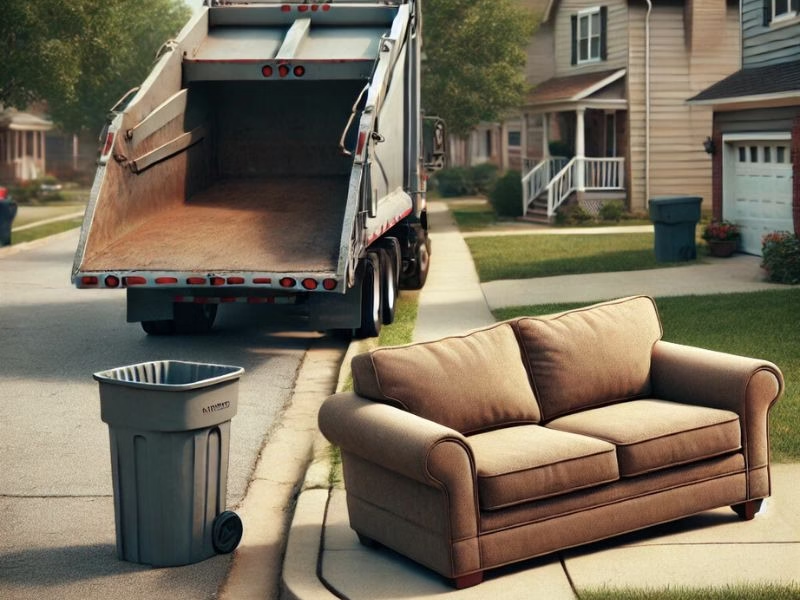Disposing of an old couch can be a daunting task, particularly if you’re not sure where to start. Whether it’s because you’re upgrading to a new model, moving homes, or simply looking to declutter, finding the most efficient and environmentally responsible way to dispose of your couch is important. This guide offers a variety of options to help you with how to get rid of a couch, taking into account local regulations, environmental considerations, and your personal circumstances.
Disposal Options
When it comes to getting rid of an old couch, you have several options depending on your location, the condition of the couch, and your personal preferences. The most direct method is using local landfill facilities, where you can dispose of large items like furniture. Before hauling your couch to the landfill, check with your city’s waste management department to understand any specific guidelines or scheduled bulk trash pickups that might be available. Many cities offer designated days for disposing of large items, which can save you the trouble and cost of transporting the couch yourself.

If your couch is in poor condition and not suitable for donation or sale, ensuring safe disposal is crucial. Couches contain materials that, if not handled properly, can be detrimental to the environment. For instance, couch cushions may contain foam that should not be left in landfills due to potential toxins. Therefore, it’s important to follow your local guidelines for disposal, which may include removing the cushions and disposing of them separately or ensuring that the couch is disposed of in a way that complies with local environmental protection standards.
Donation and Recycling
One of the most fulfilling ways to get rid of your old couch is to donate it, providing it’s still in good condition. Many charities and non-profit organizations accept furniture donations and often offer free furniture pickup services, making it convenient for you to give away your couch without needing to transport it yourself. Check with local charities such as The Salvation Army, Habitat for Humanity ReStore, and other donation centers that support community projects. Donating your couch not only helps someone in need but may also be tax-deductible, depending on your local regulations.
Recycling your couch is another viable option, especially if it’s not suitable for donation due to its condition. Furniture recycling programs can break down your sofa and reuse materials such as wood, metal, and certain types of foam, thereby reducing landfill waste. Search for “furniture recycling near me” to find available services in your area. Some municipalities have specific recycling programs for bulky items like couches and may offer guidelines on how to prepare your sofa for recycling. This not only supports environmental sustainability but also aligns with eco-friendly disposal practices.
Selling and Reuse
If your couch is still in marketable condition, selling it might be a beneficial option. Platforms like Craigslist, Facebook Marketplace, and local community boards offer great avenues to sell used furniture. Be honest about the condition of the couch in your listing and set a reasonable price to attract potential buyers quickly. Take clear photos from multiple angles and provide all necessary details to ensure buyers know exactly what you are offering.
Alternatively, if you’re feeling creative, consider upcycling your old couch. Upcycling involves transforming unwanted products into new materials or products of better quality or for better environmental value. This could mean reupholstering the couch, modifying its frame for a new look, or even repurposing its parts for different uses. Engaging in a DIY project not only gives your old couch a new life but also adds a unique touch to your home decor. Additionally, there are couch exchange programs in some communities where you can swap your old furniture for something new to you, which is another fun way to refresh your home’s look without spending much.
Professional Services
If you prefer a hassle-free approach to getting rid of your couch, professional junk removal services are an excellent choice. These companies can handle everything from single-item pickups to full-scale house cleanouts, offering a convenient solution for those without the means to transport a bulky couch themselves. Companies like 1-800-GOT-JUNK? and local hauling services provide scheduled pickups, often with the ability to handle same-day or next-day requests. When selecting a service, consider their recycling policies and whether they donate usable items to charity, ensuring your couch disposal aligns with sustainable practices.
In addition to junk removal companies, furniture removal companies often offer more specialized services, including dismantling and recycling components of your couch. This can be particularly useful if your couch is in a condition that does not allow for donation or sale. Ensure you discuss fees and service details beforehand, as costs can vary based on the size of the couch and the specifics of the service required.
Regulatory and Environmental Considerations
When disposing of a couch, it’s crucial to consider the local regulations that may affect how you can legally remove your furniture. Many municipalities have specific rules regarding furniture disposal, particularly when it involves potentially hazardous materials like certain foams and fabrics. Check with your local waste management agency to understand the regulations and avoid potential fines.
Moreover, adopting eco-friendly furniture disposal methods plays a significant role in environmental conservation. Seek out options that minimize environmental impact, such as donating to charities that refurbish furniture or using recycling services that dismantle couches to recover and reuse materials. By choosing environmentally responsible disposal methods, you not only comply with local regulations but also contribute to reducing waste and supporting sustainability initiatives.
Conclusion
Getting rid of a couch involves more than simply throwing out an unwanted piece of furniture. It presents an opportunity to make environmentally sound decisions and contribute positively to your community. Whether you choose to donate, sell, recycle, or use a professional service, each option offers its own benefits and considerations. By understanding the available methods and adhering to local regulations, you can ensure that your couch disposal process is as efficient and responsible as possible.




